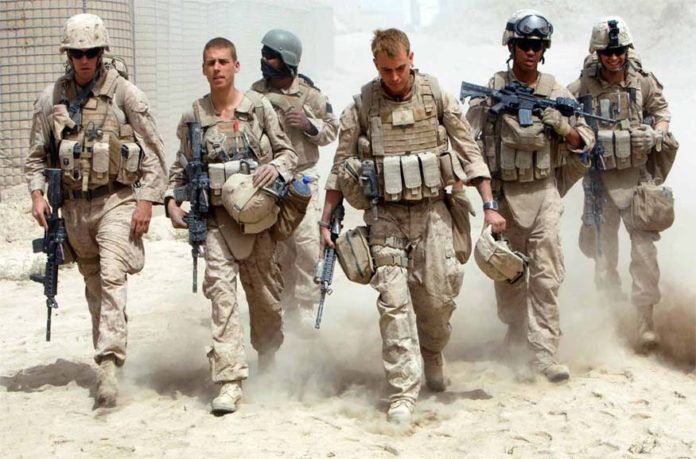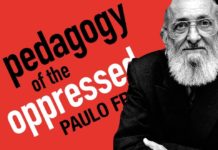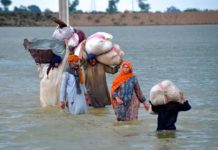Disclaimer: The Eqbal Ahmad Centre for Public Education (EACPE) encourages critical and independent thinking and believes in a free expression of one’s opinion. However, the views expressed in contributed articles are solely those of their respective authors and do not necessarily reflect the position or policy of the EACPE.
With the bulk of American forces now gone from Afghanistan, and with a mere token presence left behind, President Obama has allowed the remaining American troops to once again directly battle the Taliban, loosening restrictions on airstrikes and on ground combat in support of Afghan forces. The Americans just don’t seem to have learned much in their fifteen years stay in Afghanistan.
Let’s see how.
For any foreign venture to be successful, be it military or otherwise, there must be a national purpose that has a policy from which flows a mission with an aim. One then draws up an action plan that is implemented to achieve the aim. That’s how it works.
George Bush started out in reverse order in Afghanistan. He embarked upon an action plan that was a knee-jerk response to 9/11 which became the mission with the hazy aim of destroying Al-Qaeda that became the policy which, come Obama’s appearance on the scene, had turned into a full-blown national purpose. By the time Bush rifled through the Afghan body politic, having initially entered through the bullet sized hole of his reflex action, all that he succeeded in doing was to turn Afghanistan into a wasteland of missed opportunities with the beast of counterinsurgency, read the war of liberation for the Afghan resistance fighters, roaring full-throated in its farthest reaches. Not only that, Pakistan, America’s reluctant ally next door, laden with the dead weight of mostly third-rate leadership, too lurches from crisis to crisis in the debris as if choosing the spot for the final fall.
In the 15 long years that the Americans have been in Afghanistan, they have committed enormous amounts of treasure, drew a lot of Afghan blood and shed quite a bit of their own. Now these many years down the warpath, the Taliban have imperceptibly replaced the original enemy i.e. Al-Qaeda. And that this enemy, with makeshift bombs, rusty Kalashnikovs and often-faulty grenade launchers, comes waves upon waves at them caring a naught for their lives. Unable to beat this new foe, enthralled by their tenacity, dazzled by their willingness to die for their cause, the Americans had begun to ask of themselves, are they really their enemies, in the sense that al-Qaeda was? Is this really what they had initially set out to do? And while the Americans were busy winding down their mission, the specter of ISIS rose from the Middle East toward which the Taliban naturally tends to gravitate.
For the luckless Obama the biggest problem in succeeding a nincompoop was that he inherited one of the worst economic and national security nightmares of any President in recent American history. He started out in a huge deficit. In Afghanistan, he began in a milieu in which the Pakhtoon Afghans, the alma mater of the Taliban, actually see the Americans as invaders and occupiers. Not only that, while Obama found America encumbered with some NATO allies that were increasingly indisposed to continue as members of the war party, the Taliban on the other hand, rather than diminishing, actually multiplied in numbers. Long queues of applicants were lining up to join the ‘Jihad against the infidels’. So empowering is their ideology that, despite the odds, they are willing to continue to take up primitive arms and fight against the most powerful armed force in history. Add to this the increasing radicalization that the Afghan and Iraq jaunts have sprung upon the Muslim world and the consequent insecurity of the American people that has no parallel in history, and one begins to form up a picture of America’s problems not just in Afghanistan and their own country but in the entire Muslim World. That certain other stakeholders, i.e. China and Russia, too are slowly beginning to look at the fracas as their legitimate concern is only the icing on the cake.
The Americans just don’t seem to have learned much in their fifteen years stay in Afghanistan.
But that is not all. The Afghan army and police remain the fantasy that was long suspected by the locals of the region. The few of them that can be called somewhat regular troops or police are not willing to die for the thoroughly crooked and inept Afghan government. It is no wonder thus that the Americans were finally fed up with having to either go into battle alone or to watch over their shoulders to see if the Afghan officials with them are going to desert them or shoot them in the back. That can be a real morale-sapping exercise.
The cause for winding up the Afghan jaunt in 2014 perhaps was the hushed realization that the Americans cannot make an Afghan think like an American, want like an American and live like an American. Many after all remember that at the peak of the Soviet occupation of Afghanistan, there were 140,000 Russian troops, 300, 000 Afghan troops with tanks, helicopters and weapons to boot and tens of thousands of civilian advisers in the country who spoke all the native languages. And the Russians just did not kill only as the popular propaganda would have us believe. They built hundreds of clinics, schools, factories, roads and bridges. But in the end they lost. They lost for the single overriding reason that the Soviets failed to make the Afghan people want what the Soviets wanted them to want. Before them the British too had had similar experiences. As a matter of fact, every foreign intruder in the past couple of centuries has lost out in Afghanistan. Why the Americans thought they would be an exception, is a question they need to ask of themselves. You cannot, after all, build a nation out of unwilling disparate tribes and give them institutions they do not want. Period.
Unheeded though it was, long ago, when the Americans had initially invaded Afghanistan, this scribe had this to say to them. “Afghanistan is a land of mountains, ferocious warriors, uncompromising Islam, vicious tribal rivalries and a political convolution that entwines bloodlines, gallantry, religion and history into a mix as inscrutable to the outsider today as it has ever been. In the early 19th century, it was a land of great mystery, at the dawn of twenty-first it remains only more so. It should have been left alone to find its own natural equilibrium. Though their loyalty to Islam is fierce, yet Pakhtoon culture often seems to supersede Islamic orthodoxy. The rise and fall of Taliban is but one brief twist of history in this rugged part of the world. Taliban or no Taliban, resisting foreign occupation of their lands is a way of life for them. After the exit of the Soviets from Afghanistan, the Taliban phenomenon could hold their interest for only as long. If there were no foreign occupiers soon enough, the Pakhtoon would have had to invent some to go on with their way of life. Their tussle with the Northern Alliance was nothing but a poor substitute for this fact. The Americans should have known.” This fact will be reinforced when the Americans do finally leave Afghanistan. Before long the world will see these same Afghan tribes getting down to their old ways of internal blood letting and living happily thereafter. They will only change when they decide to change and not a day before that.
The American paradox, on the other hand, can be summed up in what Ralph Peters once said. He noted, “why did we go to Afghanistan in 2001? Because of al-Qaeda. To punish them, to smash them, and to punish those who harbored them. Afghanistan was a low-budget terrorist motel. So the feds raid the motel, kill some of the bad guys, capture some, and others escape. And instead of going after the ones who escaped, we decided to renovate the motel.”
The irony with the latest Presidential decree is that too late in the day the Americans have decided to go after the ‘escapees’.
Now, as the Empire heaves into yet another surge in the shape of unshackled military response to the Taliban before it slinks back, perhaps its soldiers will take along some snapshots of the ruins in their duffel bags as mementos of their stay in Motel Kandahar.
About the Author:
 Anwaar Hussain is an ex F-16 fighter pilot from Pakistan Air Force. A Masters in Defense and Strategic Studies from Quaid-e-Azam University of Islamabad. He now resides in Canada. He started writing as a hobby some years back and has, since then, published a series of articles in The Pakistan Tribune, The Baltimore Chronicle, Defense Journal and a host of other prestigious publications and web portals. Other than international affairs, Anwaar Hussain has written extensively on religious and political issues that plague Pakistan.The reason for taking up the pen, in his own words, is, “For years I had been watching lies being peddled as truths in the name of God, king or country. I always felt that truth needed no crutches for it has neither a religion nor a nationality. It owes its loyalty only to its own unadulterated self. May the truth be our companion.” He can be contacted at airdance@outlook.com
Anwaar Hussain is an ex F-16 fighter pilot from Pakistan Air Force. A Masters in Defense and Strategic Studies from Quaid-e-Azam University of Islamabad. He now resides in Canada. He started writing as a hobby some years back and has, since then, published a series of articles in The Pakistan Tribune, The Baltimore Chronicle, Defense Journal and a host of other prestigious publications and web portals. Other than international affairs, Anwaar Hussain has written extensively on religious and political issues that plague Pakistan.The reason for taking up the pen, in his own words, is, “For years I had been watching lies being peddled as truths in the name of God, king or country. I always felt that truth needed no crutches for it has neither a religion nor a nationality. It owes its loyalty only to its own unadulterated self. May the truth be our companion.” He can be contacted at airdance@outlook.com








